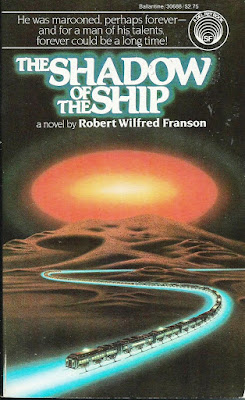1 / 5 Stars
I got about half-way through the book before giving up in exasperation…….it’s not a very good novel.
It certainly has an interesting premise: among the 54 habitable planets comprising the Nation, interplanetary travel is accomplished not by spaceships, but by ground transport using specialized wormholes called ‘trails’: extra-dimensional tracks through hyperspace.
These trails – which are perhaps of alien origin - can be hundreds, perhaps thousands of miles in length; the habitable and uninhabitable planets of the Nation lie along the trails like beads on a string.
Travelling these various trails requires the use of self-contained, pressurized cars, which are linked like a train, and pulled by unique, elephant-like animals called waybeasts. The extra-dimensional space within which the trails lie is airless vacuum; its dangers are severe, for anyone or anything that moves too far outside the narrow boundaries of the trail can be instantly disintegrated by cosmic forces unknown.
The hero of ‘Shadow’ is a man named Hendrik Eiverdein Rheinallt. ‘Eiverdein’, as he is called, is sponsoring a unique caravan expedition into the farther reaches of the Blue Trail, where, it is rumored, a spaceship has been seen. Everdein’s ambition is to recover the spaceship, and use it to return to his long-lost homeland of Earth.
The narrative centers on the long journey of the caravan, and various political and personal intrigues and conspiracies of its passengers – for there are those in the Nation who would not like to see interplanetary or interstellar travel replace the profitable caravan routes.
‘Shadow’ was the first novel of author Franson, and it has the self-consciously ‘literary’ attitude of many first novels: it is intent on displaying the author’s skills as an artisan of written prose, rather than telling a good story.
Much of the writing and the dialogue have a stilted quality, as well as the use of a lot of empty words and phrases, as this example shows:
“Men exploiting the appearance of violent strength come from safe lands where a shove or a punch is the worst physical results; so violent gestures and attitudes are meaningless except as intimidation or insults.”
Rheinallt grinned. “You wish to apply this dichotomy to me rather than to yourself ? Remember that not all weapons are as visible as an axe.”
“Correct; there is also organization. Come, Eiverdein: from what sort of place do you hail ?”
“A cloud-soft land; but there were violent elements.”
Here’s a remark from a floating cat-like alien (?!) named Arahant:
“Perhaps that lack of kinship is what saved my aural channels from overload at Whitecloud. A selective deafness to overbearing shrillness is scarcely vulgar. It’s essential to be able to close one’s ears to high-altitude winds; all the Luftmenschen know that. Besides, I wouldn’t be able to understand the structural nuances of my own operas if – “
Here’s an example of what can politely be called ‘wooden’ exposition:
Late on the next Clockday Rheinallt was sitting at his desk, feeling bewebbed in the hassles of administering a caravan en route. Glenavet, he thought, was more or less neutralized by the death of his active associate, the delegate Wirtellin. Rheinallt did not expect him to cease his advocacy among the caravaneers, but tentatively had pegged him as a basic trailhand: honest enough, not imaginative, and not unnecessarily violent.
To make matters worse, when someone aboard the caravan dies as a result of foul play, it's an excuse for the author to insert a blank-verse poems, under the pretext of having a Bard sing the travelers a funeral dirge.........here's a couple of verses:
Whistle down the darkened plain
Where the silent vacuum shrieks
Like Time's hungry wind alone
...
Some are leaping up to vanish
Where a fear of edge of death
Can't flatter life to bribe a foothold
To matter where there is none
So long the chord is gone
...
Some are rushing home to nothing
Where they're turning off their mind
To chatter brightly like a person
And batter down their echoed soul
And empty hiss like steam
The verdict ? With better editing, this could have been a worthy first novel, but as it stands, 'The Shadow of the Ship' is best avoided.

























